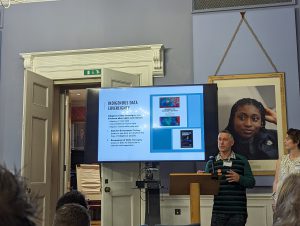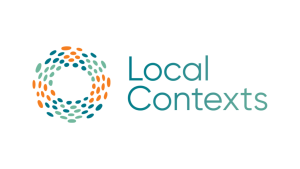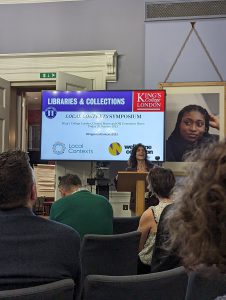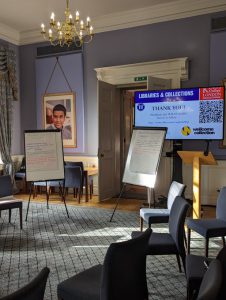By Hannah Gibson, King’s Archives, King’s College London
The Local Contexts Symposium was held on 20th October 2023. It was hosted by Cathy Williams (Head of Archives, KCL) and Dr Manuela Pallotto Strickland (Metadata and Digital Preservation Coordinator, KCL).
The symposium was convened with the intention of sharing expertise from within the organisation, building connections with external partners, generating discussion, sharing implementation examples and hearing about existing projects which could benefit from the framework. We know that our collections contain relevant material, but it will take time to identify, and an ongoing commitment to building relationships with communities whose material we hold.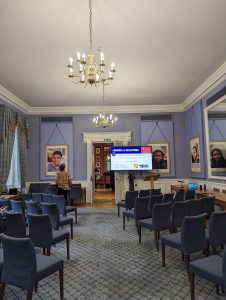
External guests included Local Contexts’ founding team members Dr Jane Anderson and Maui Hudson from New York University and the University of Waikato, and Dr Alexandra Eveleigh, Nicola Cook and Angela Saward from Wellcome Collection.
From within King’s, we heard from Special Collections, King’s Digital Lab, Archives, Libraries, anti-racist journal Stolen Tools, and the Anti-Racism Community of Practice. Academics from Digital Humanities, Comparative Literature and History departments were in attendance.
Local Contexts is a global non-profit organisation founded in 2010 to address the needs of Indigenous and local organisations. The sacred objects, audio and visual recordings, photos, samples, and textiles of Indigenous communities are held in institutions including galleries, libraries, archives and museums all over the world. There was desire for a practical methodology to deal with the range of intellectual property issues that arise in relation to managing Indigenous cultural heritage materials. Indigenous communities rarely hold the copyright of collections which contain Indigenous knowledge, which has implications for the use and reuse of that material.
The Local Contexts framework acts as a means of redressing the enormous power imbalance between a community of origin and holding institutions. Local Contexts’ objective is to ‘enhance and legitimize locally based decision-making and Indigenous governance frameworks for determining ownership, access, and culturally appropriate conditions for sharing historical, contemporary, and future collections of cultural heritage and Indigenous data’.
Local Contexts have developed notices and traditional knowledge and biocultural labels which can be added to metadata in catalogues, and a hub where institutions and communities can contact each other and draw attention to the presence of indigenous material in collections. The aim is to make Indigenous material in collections discoverable – if communities can’t find material, they can’t govern it.
The notices are designed to invite collaboration and relationship building. They signpost material in collections that may be partial, mislabelled, misattributed, or incompletely described. Notices create a space to insert provenance, protocols, and permissions. They enable material to be labelled, in collaboration with Indigenous communities. The labels relate to traditional knowledge and reintroduce that knowledge to the catalogue. This should be an educated and ethical exercise, a means of breaking the singularity of institutional authority.
The symposium opened with an introduction from Lis Hannon (Director of Libraries and Collections, KCL) and Cathy Williams.
In their presentation Jane and Maui impressed upon us the work, commitment, and dedication that Local Contexts requires from institutions and communities through their explanation of the notices and TK labels. It was especially interesting to hear about the introduction of Biocultural labels, and the ways in which these can be embedded in the workflow of current and ongoing research, rather than as a retrospective exercise. This approach acknowledges Indigenous interest from the inception of a research project. Current research can repeat and entrench mistakes. They also impressed that Indigenous communities are not homogenous, and that each Local Contexts project is an ever-evolving collaboration.
The Wellcome Collection team presented the Indigenous Knowledges project, a grant-funded endeavour to create prototype labels to enable digitally equitable access. They outlined the specific challenges of engaging with Local Contexts from a UK perspective. This challenge will be central to KCL’s ongoing engagement with Local Contexts. Without established links to Indigenous communities, a long-term commitment to relationship building is required before the notices can become labels, and before collaboration can occur. It was especially interesting to hear how much internal advocacy was required to support the project. The outcomes of Indigenous Knowledges generated residencies, reading groups, symposiums, and webinars. It was valuable to hear from an established external project using the Local Contexts Hub.
The afternoon consisted of short talks from within the King’s community. Samantha Callaghan, a Research Software Analyst from King’s Digital Lab presented a talk on Indigenous Digital Humanities that emphasised the importance of projects that deliver measurable benefits for communities and result in culturally appropriate outputs.
Dr Ricardo Twumasi, Lecturer in Organisational Psychiatry & Psychology introduced the anti-racist academic journal Stolen Tools. He emphasized that publications are the currency of academia, the widespread racism experienced by diverse academics and the need to decolonise journals as restorative action.
Victoria Parkinson, (Library Solutions Manger, KCL) gave a remote talk on the impossibility of neutrality in library cataloguing, setting out the challenges of using the Library of Congress subject headings.
Dr Maria Cristina Juan (Project Head, Philippine Studies at SOAS), delivered a talk on the Digital Repatriation of a Lost Archive of the Spanish Pacific. This Digital Futures project used material from KCL Special Collection to recreate a ransacked library by digitally reuniting looted material that now sits in disparate collections across the globe.
William Wood’s (Senior Library Assistant, Special Collections) excellent presentation on The Ngarrindjeri Grammar was particularly affecting in the immediate aftermath of The Voice referendum result in Australia.
I supported Jane Picciano in her delivery of the KCL Anti-Racist Community of Practice (ARCoP) presentation. She outlined the grass roots origins of the ARCoP, its establishment by global majority KCL Libraries staff members during the pandemic, and its evolution into a non-hierarchical group focussed on education and participation. The ARCoP is frequently consulted on equality, diversity and inclusion initiatives within L&C and is helping other directorates establish CoPs.
The symposium generated a lot of discussion and raised many questions. Amongst them were questions of how best to deal with difficult collections, and how to build reciprocal relationships which don’t mirror the extractive practices of colonial collecting. We also discussed the challenges of engaging with these frameworks in a fraught cultural environment characterised by polarisation. It is hoped that the symposium will help to build an internal network and galvanise engagement with Local Contexts. Local Contexts is a framework which could help to crystalize efforts to build services and systems to surface Indigenous materials within King’s Collections.
